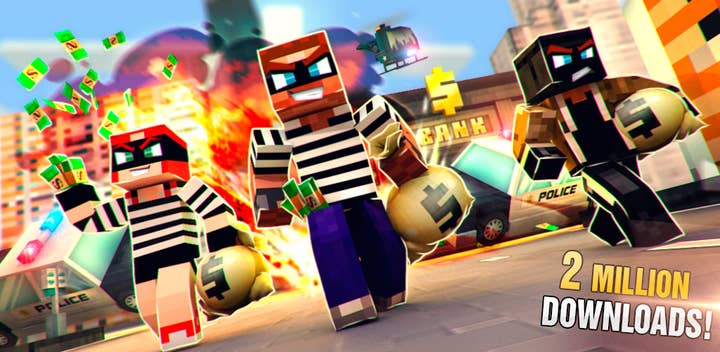How to pitch your mobile game to a publisher
Sponsored article: Lab Cave's Jami Wardman explains how to pitch your game in the mobile space
So you're making a mobile game and you're certain it's awesome, but you need the right publishing partner to take the whole thing up a level.
Almost every publisher will be able to offer funding and marketing, but in the mobile space a publisher should also understand a great deal about player retention, User Acquisition, App Store Optimization, ad mediation and all the other factors unique to mobile that will make your game a success for you and for them.
Find a publisher
You've worked hard on your game and it's been a big part of your life for a long time, so you'll want a publisher which treats your work with respect and care. A good starting point is to look for publishers with experience working on similar titles, but without any current direct competitor to your own game. Take time to do your research, ask other devs and find a publisher that has the know-how to publish your game successfully and the ability to offer a deal that's fair to your team.
Look for publishers with experience working on similar titles, but without any direct competitor to your own game
The most efficient route to finding a publisher and building a good relationship fast is to attend a conference -- GDC, Gamescom, Nordic Game, PocketGamer Connect or one of GamesIndustry.biz's own networking events, for example. In 2020 those events have shifted online so the barrier to entry has never been lower. In a single day you could schedule around a dozen meetings and get a broad idea of what's out there.
If handling all this research and negotiation feels like too much, there are agencies that will take the strain off of finding a publisher for a fee. Agencies vary in quality and rates, so there's no escaping the need to do some research. A good starting point is to ask an agency who they have worked with before, which games they placed with publishers, reach out to those devs and find out how it went for them.
Make your approach
Your game probably has many features, a rich backstory and lots of interesting tales from its development. You could discuss it for hours, but what is your game about if you need to explain it in five seconds? The term 'elevator pitch' isn't new, but with more games than ever being made, it's perhaps more important than ever.
Your pitch should look to grab immediate attention and open the door to further explanation, whether you're making your approach in an email, in a crowded convention center, or on Zoom. Your elevator pitch is the hook you want a publisher biting on, then you can reel them in with more information.

Most approaches will be made by email. Keep it short. Lead with that elevator pitch and follow with a strong visual in the body of the email. You really don't need to introduce every feature of your game or the composition of your studio -- those are conversations for later. Hit them with the essentials:
- What type of game is it?
- What's the main premise?
- What makes it unique?
- What platforms will it launch on?
- How does it monetize?
- How complete is it, and what will it take to launch it?
- And what do you need from them? Marketing? Monetization? User Acquisition? Something else?
Remember that they're buying into you as much as the game. Talk with enthusiasm while avoiding hyperbole or overpromising
That's enough for a potential publisher to know if they'd like to hear more. Be sure to drop a link to a good example of game footage in the email body, and attach a more detailed overview deck, including some artwork and planned monetization loops.
In real life -- whether on a video call or at a convention some months from now -- your approach can offer very similar details, perhaps with a neat visual presentation (or better yet: playable gameplay), but remember that they're buying into you as much as the game. Bring good energy to the meeting, talk with enthusiasm while avoiding hyperbole or overpromising, and look to get good energy back.
Ask good questions...
Whenever I ask a developer what they're looking for, the first answer is almost always the same: marketing. But marketing is just scratching the surface of what a publisher can (and should) be able to offer. Ask for more!
- Get feedback on your monetization loops and suggestions for improvement.
- Ask about User Acquisition campaigns and how they're budgeted.
- Will they handle PR to achieve organic coverage like reviews and news stories?
- Will they write your press releases, or will you?
- How much effort will they put into App Store Optimization?
- Will they help look after ad mediation too?
- How will they continue to support your store pages, UA and advertising after launch?
- Can they offer QA or a development support team to help polish your game and provide feedback on gameplay (if you need it)?
These questions will help you find a good publisher, as well as help weed out any that aren't suitable. Making it clear to any potential publisher you know what you're looking for will save you time and effort in the long run.

...And give good answers
If you make it to the next stage of discussion, be ready with good answers. Know when you'll make it to launch and outline any challenges or blockers that stand in your way. Are you looking for funding? Offer an itemized breakdown of how their money will be spent over the coming months, and how that will lead to a finished game. Visualizing this in a roadmap can help a publisher better understand exactly what is going where.
Know what your first six months after launch will look like, and what updates you have planned to keep the game vibrant and retain users -- especially those who have already been purchased through your publisher's UA campaigns.
And be especially precise if you're building a free-to-play game. Free-to-play games need solid monetization loops to be successful. Most of the time, these are decided at the game design level, not after the game is playable. Know the business model in advance. While some publishers may still want to see your game and help you, smaller publishers are unlikely to take on a project which requires a large amount of redesign work.
See the process through
Be especially precise if you're building a free-to-play game. [They] need solid monetization loops to be successful
Mobile publishers receive a huge number of approaches. Yours will be memorable because you'll make a short, snappy and exciting pitch, but don't overreact if you don't hear from them right away. It's possible your game is being shared with multiple team members to gather feedback... It's equally possible that it's been lost in the rush of a busy week.
Follow up with a polite email, ask if they're interested or have any feedback. Don't be too insistent. Give them ten to 14 days to respond (a little longer if your first meeting was at a trade show because they'll be following up on lots of meetings). You may be corresponding with one person, but they will have a team behind them providing feedback, and more people in the process means more time to reach the finish line.
If a publisher is interested, you can send a playable version. Many mobile publishers are looking for metrics like user retention (D1, D7, D30), conversion rate of paying players, engagement (average session time, and so on), so if you have data available, include them with your playable demo. Choose meaningful metrics, but also ones that highlight the strengths of your title. If you haven't yet reached the point where your game has a solid tutorial or introduction, make sure the publisher knows what to do and what slice of the game you're sharing.
Don't feel you're pressing your luck by insisting they sign a Mutual Non-Disclosure Agreement before offering confidential materials. It's great if your studio has a standard MNDA ready to go, but be open to using a publisher's document so long as you're comfortable with their terms. Your contact's hands might be tied by their own legal team so you may need to be flexible -- or this may be the first sign that the publisher is not for you.

Signing up
The contract process will depend upon the company you're negotiating with, but if you can afford it you should take the contract to a lawyer. There are a number of fantastic lawyers who focus on the video game space and they will be able to give you feedback on the contract and let you know what you need to protect yourself.
It's easy to focus on the financial incentives of the agreement, but make sure you know and understand everything expected of you, your team and the publisher you are working with. Bring your team along for the journey, and make sure they're on board with the details of the contract, as it will affect their working day too.
Conclusion
Before you begin searching for a publisher, understand your goals and, most importantly, your game. You don't need to be an expert on publishing, marketing or PR -- that's what the publisher is there for -- but remember you're the primary authority on your game and what you want from it, so make those needs clear from the very beginning.
Remember: a successful game means you'll be working with your publisher for many years. It's a partnership, so be sure it works for you and for everyone involved!
Lab Cave by SunMedia is a mobile publisher and mobile growth service provider focused on ASO, ad mediation, monetization, publishing, analytics and User Acquisition. Visit Lab Cave Games at its new homepage, and pitch your game to Jami Wardman and the Lab Cave team at hola@labcavegames.com.
